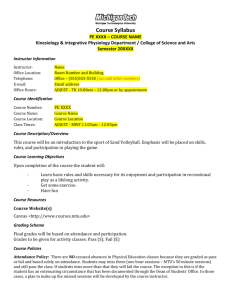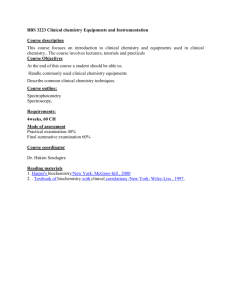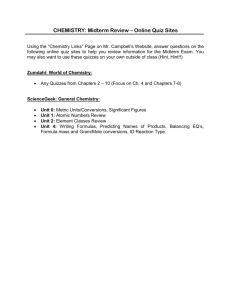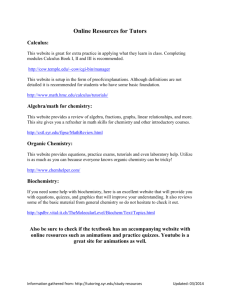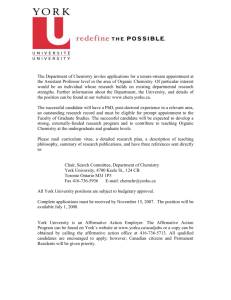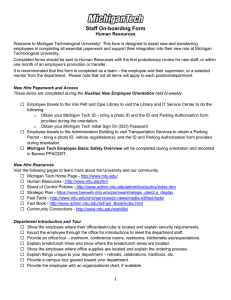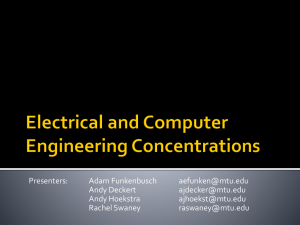CH4710 - Chemistry
advertisement
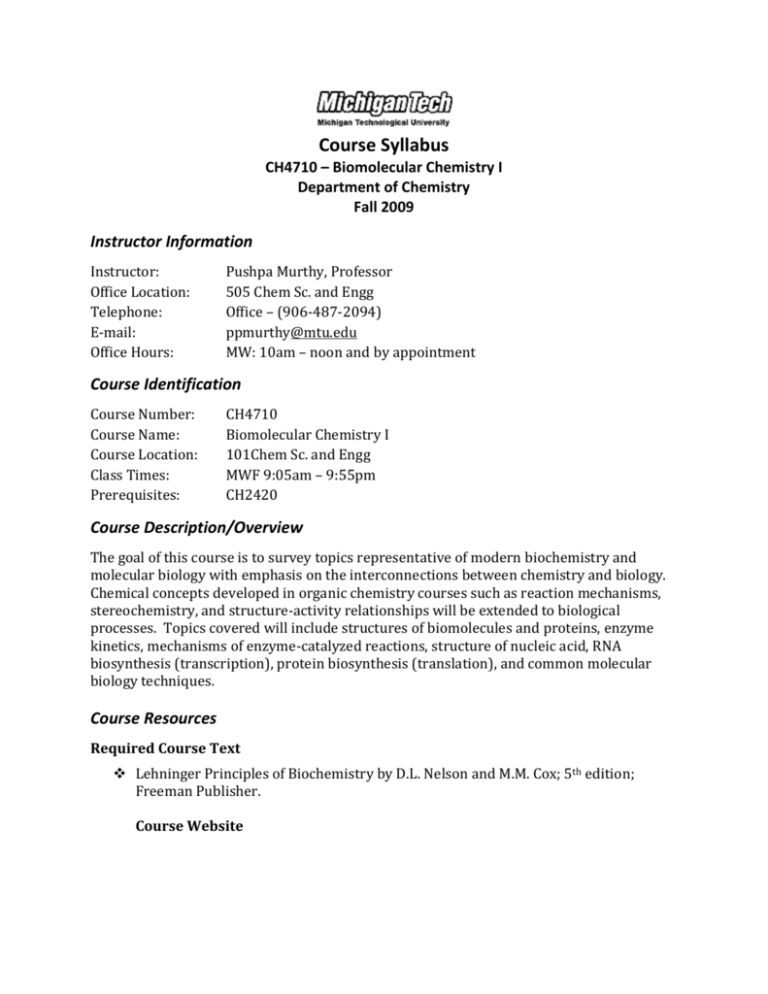
Course Syllabus CH4710 – Biomolecular Chemistry I Department of Chemistry Fall 2009 Instructor Information Instructor: Office Location: Telephone: E-mail: Office Hours: Pushpa Murthy, Professor 505 Chem Sc. and Engg Office – (906-487-2094) ppmurthy@mtu.edu MW: 10am – noon and by appointment Course Identification Course Number: Course Name: Course Location: Class Times: Prerequisites: CH4710 Biomolecular Chemistry I 101Chem Sc. and Engg MWF 9:05am – 9:55pm CH2420 Course Description/Overview The goal of this course is to survey topics representative of modern biochemistry and molecular biology with emphasis on the interconnections between chemistry and biology. Chemical concepts developed in organic chemistry courses such as reaction mechanisms, stereochemistry, and structure-activity relationships will be extended to biological processes. Topics covered will include structures of biomolecules and proteins, enzyme kinetics, mechanisms of enzyme-catalyzed reactions, structure of nucleic acid, RNA biosynthesis (transcription), protein biosynthesis (translation), and common molecular biology techniques. Course Resources Required Course Text Lehninger Principles of Biochemistry by D.L. Nelson and M.M. Cox; 5th edition; Freeman Publisher. Course Website Syllabus, problem sets, and sample quizzes and exams can be found at http://www.chemistry.mtu.edu/pages/courses/class.php?class=CH4710&section= 0A&sem=20081 Grading Scheme Grading Policy Grades will be based on the following: Midterm I Mid-term II Final exam (comprehensive) Quizzes 25% 25% 40% 10% Schedule of Exams Midterm I: 2 Oct. 2009 (5th week) Midterm II: 11 Nov. 09 (11th week) Final Exam: 16 Dec. 09 (Wednesday); 8-10 am (Final exams week) Grading System Letter Grade A AB B BC C CD D F Percentage 90% & above 85% – 89% 80% – 84% 75% – 79% 70% – 74% 65% – 69% 60% - 64% 59% and below Grade points/credit 4.00 3.50 3.00 2.50 2.00 1.50 1.00 0.00 Rating Excellent Very good Good Above average Average Below average Inferior Failure Course Policies I want a lot of classroom participation. By participation, I mean enthusiastic engagement during class, asking and answering questions, and articulating and defending your ideas. You must come to all classes. Please be punctual; chronic lateness annoys fellow students and me. University Policies Academic regulations and procedures are governed by University policy. Academic dishonesty cases will be handled in accordance the University's policies. If you have a disability that could affect your performance in this class or that requires an accommodation under the Americans with Disabilities Act, please see me as soon as possible so that we can make appropriate arrangements. The Affirmative Action Office has asked that you be made aware of the following: Michigan Tech complies with all federal and state laws and regulations regarding discrimination, including the Americans with Disabilities Act of 1990. If you have a disability and need a reasonable accommodation for equal access to education or services at Michigan Tech, please call the Dean of Students Office, at 487-2212. For other concerns about discrimination, you may contact your advisor, department head or the Affirmative Action Office, at 487-3310 Academic Integrity:http://www.studentaffairs.mtu.edu/dean/judicial/policies/academic_integrity.h tml Affirmative Action: http://www.admin.mtu.edu/aao/ Disability Services:http://www.admin.mtu.edu/urel/studenthandbook/student_services.html#disa bility Equal Opportunity Statement: http://www.admin.mtu.edu/admin/boc/policy/ch3/ch3p7.htm Course Outline I. Fundamentals of Biochemistry Chapter 1: The Foundations of Biochemistry Problems 7, 8, 11, 12 and Problem Set I Chapter 2: Water Problems 12, 13, 14, 28, and Problem Set 2 II. Proteins and Enzymology Chapter 3: Amino acids, Peptides and Proteins Problems 2, 3a, 4, 5, 6a,b, 11a, 12, 13 and Problem Set 3 Chapter 4: The Three-Dimensional Structure of Proteins Problems 1, 4, 5, 6, 10 and Problem Set 4 Chapter 6: Enzymes Problems 1, 4, 7, 18 and Problem Set 5 III. Nucleic acid and Information Transfer Chapter 8: Nucleotides and Nucleic Acids Problems 2,8, 9, 10, 11 and Problem Set 6 Chapter 9: DNA-based Information Technologies Problem Set 7 Chapter 24: Genes and Chromosomes Chapter 26: RNA metabolism Problem 2, 3,5,10 and Problem Set 8 Chapter 27: Protein Metabolism Problems 1, 2, 3, 4, 5, 6, 9

